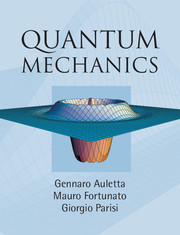Book contents
- Frontmatter
- Contents
- List of figures
- List of tables
- List of definitions, principles, etc.
- List of boxes
- List of symbols
- List of abbreviations
- Introduction
- Part I Basic features of quantum mechanics
- Part II More advanced topics
- 6 Angular momentum and spin
- 7 Identical particles
- 8 Symmetries and conservation laws
- 9 The measurement problem in quantum mechanics
- Part III Matter and light
- Part IV Quantum information: state and correlations
- Bibliography
- Author index
- Subject index
9 - The measurement problem in quantum mechanics
Published online by Cambridge University Press: 05 June 2012
- Frontmatter
- Contents
- List of figures
- List of tables
- List of definitions, principles, etc.
- List of boxes
- List of symbols
- List of abbreviations
- Introduction
- Part I Basic features of quantum mechanics
- Part II More advanced topics
- 6 Angular momentum and spin
- 7 Identical particles
- 8 Symmetries and conservation laws
- 9 The measurement problem in quantum mechanics
- Part III Matter and light
- Part IV Quantum information: state and correlations
- Bibliography
- Author index
- Subject index
Summary
In most textbooks, measurement does not receive the full attention it deserves and sometimes is even not treated at all, apart a brief and cryptic mention of the “reduction of the wave packet.” However, in the last decades, the situation has profoundly changed and it is time to consider measurement a fundamental part of quantum mechanics, even, to a certain extent, an important generalization of the traditional theory (see also Chs. 14–15).
This chapter consists of three major parts. In the first block (Secs. 9.1–9.4) we develop the main physical features of the measurement process: the heart of the argument is here represented by the aspects related to the interpretation. In the second part (Secs. 9.5–9.8) we discuss several special (and partly interdependent) topics of measurement: the heart here is represented by experimental aspects. In the third part (Secs. 9.9–9.12) we deal with the measurement process on a more formal plane, making use, in particular, of the generalization represented by the concepts of effect and positive operator valued measure (POVM).
As we have said, the measurement problem is one of the most fundamental issues in the conceptual structure of quantum mechanics (as described in Sec. 9.1) and has a long history that will be examined in Sec. 9.2. In this context, the existence of apparently paradoxical quantum states comes about: the so-called Schrödinger cat states (see Sec. 9.3).
- Type
- Chapter
- Information
- Quantum Mechanics , pp. 277 - 354Publisher: Cambridge University PressPrint publication year: 2009



